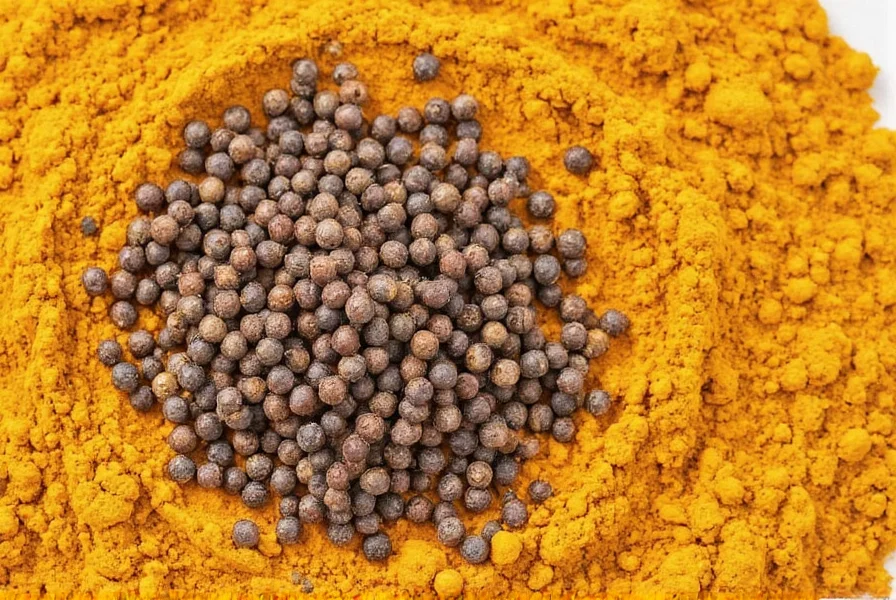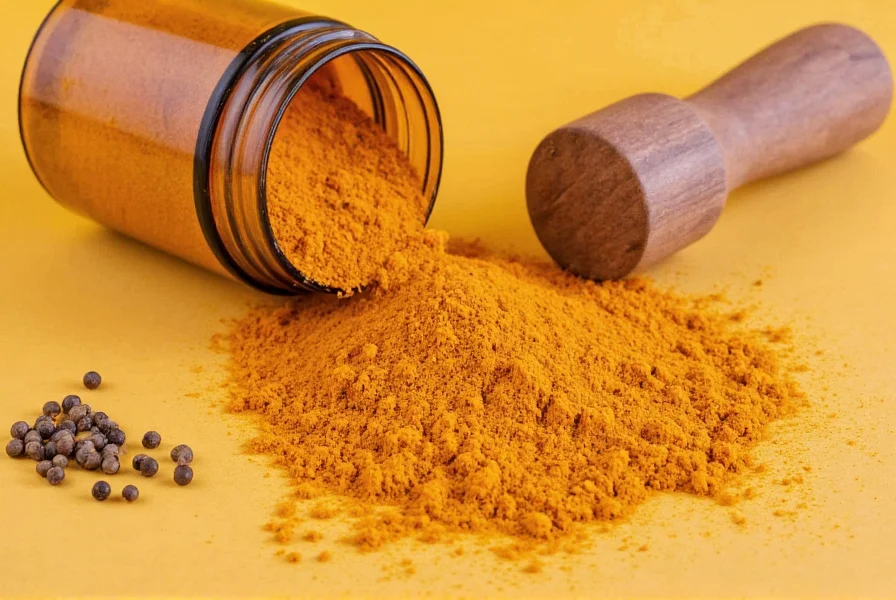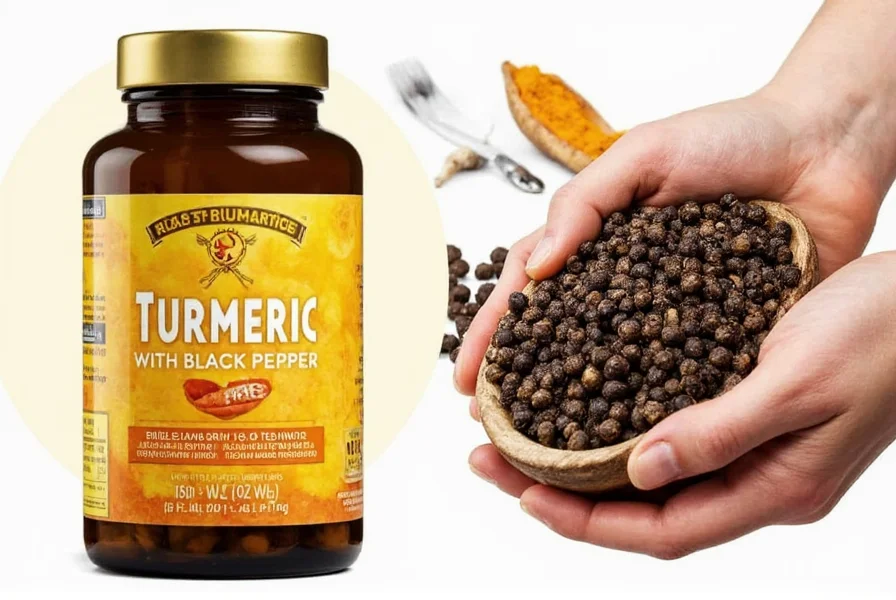Curcumin, the primary bioactive compound in turmeric, has demonstrated impressive anti-inflammatory and antioxidant properties in scientific studies. However, its therapeutic potential has been limited by poor bioavailability—meaning your body struggles to absorb and utilize it effectively. This is where black pepper enters the equation, creating a powerful synergy that transforms turmeric supplementation.
The Bioavailability Challenge of Turmeric
Turmeric contains only about 3% curcumin by weight, and even this small amount faces significant absorption challenges. When consumed alone, curcumin rapidly metabolizes in the liver and intestinal wall, with studies showing less than 1% entering the bloodstream. This poor bioavailability has long been a hurdle for researchers studying turmeric's potential health benefits.
Black Pepper's Game-Changing Role
Black pepper contains piperine, a bioactive alkaloid that inhibits certain enzymes responsible for metabolizing curcumin too quickly. Research published in Planta Medica demonstrated that combining just 20mg of piperine with 2g of curcumin increased curcumin bioavailability by an astonishing 2,000%. This dramatic improvement means your body can actually utilize the curcumin you consume.

Scientific Evidence Behind the Combination
Multiple studies have validated this synergistic relationship:
| Study | Findings | Bioavailability Increase |
|---|---|---|
| Shoba et al. (1998) | 2g curcumin + 20mg piperine | 2,000% |
| Anand et al. (2010) | Curcumin with piperine vs. curcumin alone | 1,540-2,000% |
| Taylor et al. (2016) | Curcumin-piperine combination in arthritis patients | Significantly reduced inflammation markers |
Practical Benefits of This Combination
The turmeric supplement with black pepper formulation delivers tangible advantages:
- Enhanced anti-inflammatory effects - Crucial for managing chronic inflammatory conditions
- Improved antioxidant protection - Better neutralization of free radicals throughout the body
- Greater cognitive support - More curcumin reaches the brain to potentially support cognitive function
- Joint health improvements - Studies show better outcomes for arthritis symptoms
- Cardiovascular benefits - Improved endothelial function with consistent use
Dosage Considerations for Maximum Benefit
For optimal results with turmeric supplement with black pepper, consider these evidence-based guidelines:
- Look for products containing 400-500mg of curcumin per serving
- Ensure at least 5-10mg of piperine is included (standardized to 95% piperine)
- Take with a meal containing healthy fats to further enhance absorption
- Split doses throughout the day rather than taking a single large dose
- Consistent daily use for at least 4-8 weeks to notice significant effects
Safety Profile and Potential Interactions
Turmeric supplement with black pepper is generally well-tolerated, but certain considerations apply:
- Piperine may increase absorption of certain medications, potentially affecting blood levels
- Consult your healthcare provider if taking blood thinners, diabetes medications, or antidepressants
- High doses may cause mild digestive upset in sensitive individuals
- Pregnant or breastfeeding women should consult a healthcare professional before use
- Those with gallbladder issues should exercise caution with turmeric supplementation

Choosing a Quality Turmeric Supplement with Black Pepper
Not all formulations deliver on their promises. When selecting a turmeric supplement with black pepper, look for:
- Certified organic turmeric root extract standardized to 95% curcuminoids
- Black pepper extract standardized to 95% piperine (not just whole black pepper)
- Third-party testing verification from organizations like USP, NSF, or ConsumerLab
- Transparent labeling showing exact amounts of curcumin and piperine
- Minimal additional ingredients beyond what's necessary for absorption
- Reputable manufacturers with established quality control processes
Realistic Expectations for Turmeric Supplement Benefits
While the turmeric supplement with black pepper combination significantly improves bioavailability, it's essential to maintain realistic expectations. Curcumin works gradually and requires consistent use. It's not a miracle cure but rather a supportive component of a comprehensive health strategy that includes proper nutrition, exercise, and other healthy lifestyle factors.
Research suggests the most significant benefits emerge with regular use over several weeks or months, particularly for inflammatory conditions. The enhanced absorption from black pepper makes these benefits more achievable with standard dosing, but individual responses may vary based on health status, genetics, and other factors.
Conclusion: A Scientifically-Supported Formulation
The addition of black pepper to turmeric supplements represents one of the most scientifically validated advancements in herbal supplementation. By addressing turmeric's fundamental bioavailability challenge, this combination allows consumers to access the full spectrum of curcumin's potential health benefits. When selecting a turmeric supplement with black pepper, prioritize quality, transparency, and evidence-based formulation to ensure you receive the maximum benefit from this powerful natural compound pairing.
How much black pepper should be in a turmeric supplement for optimal absorption?
Research shows that 5-10mg of standardized black pepper extract (95% piperine) per 500mg of curcumin provides optimal absorption enhancement. This ratio, based on clinical studies, increases curcumin bioavailability by up to 2,000% without causing digestive discomfort that higher piperine doses might produce.
Can I get the same benefits by adding black pepper to turmeric in my food?
While adding black pepper to turmeric in cooking does enhance absorption to some degree, the effect is significantly less than with standardized supplements. Food preparation methods degrade some active compounds, and you'd need to consume impractical amounts of turmeric (several tablespoons daily) to reach therapeutic curcumin levels, even with black pepper added.
How long does it take to notice benefits from turmeric with black pepper supplements?
Most people begin noticing subtle benefits within 2-4 weeks of consistent daily use, with more significant effects appearing after 6-8 weeks. Those using turmeric supplement with black pepper for inflammatory conditions often report reduced joint discomfort first, while cognitive benefits may take longer to manifest. Individual responses vary based on health status and the specific condition being addressed.
Are there any medications that shouldn't be taken with turmeric and black pepper supplements?
Yes, piperine can increase the absorption of certain medications, potentially affecting their blood levels. This includes blood thinners (like warfarin), diabetes medications, some antidepressants, and certain chemotherapy drugs. Always consult with your healthcare provider before combining turmeric supplement with black pepper with prescription medications to avoid potential interactions.
What's the difference between turmeric, curcumin, and curcuminoids?
Turmeric is the whole root spice. Curcumin is the primary active compound in turmeric, making up about 3% of the root. Curcuminoids refer to the group of related compounds including curcumin (diferuloylmethane), demethoxycurcumin, and bisdemethoxycurcumin, which together constitute about 5-6% of turmeric. High-quality turmeric supplements with black pepper typically standardize to 95% total curcuminoids, not just curcumin alone.











 浙公网安备
33010002000092号
浙公网安备
33010002000092号 浙B2-20120091-4
浙B2-20120091-4